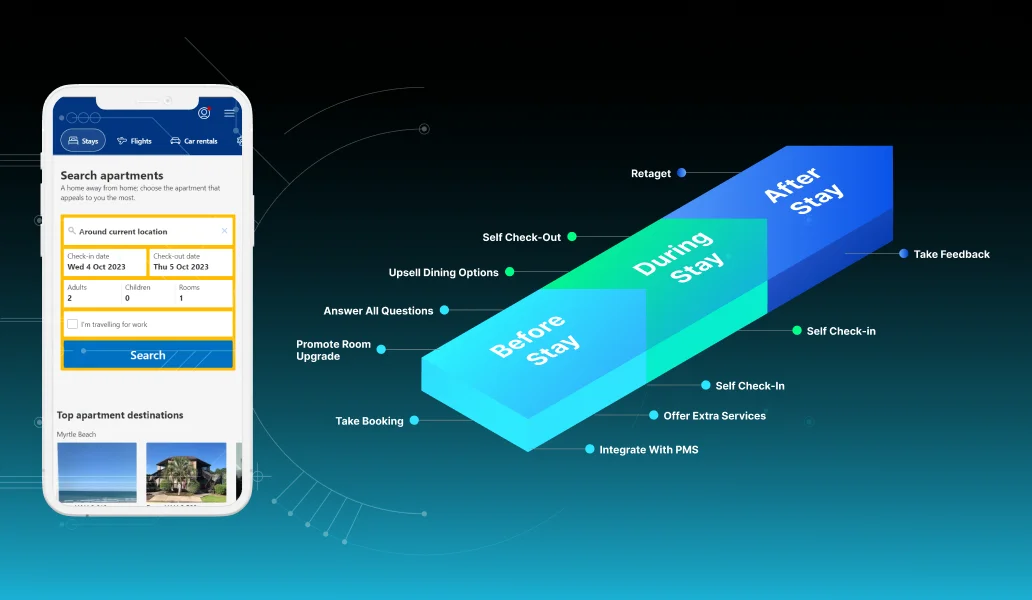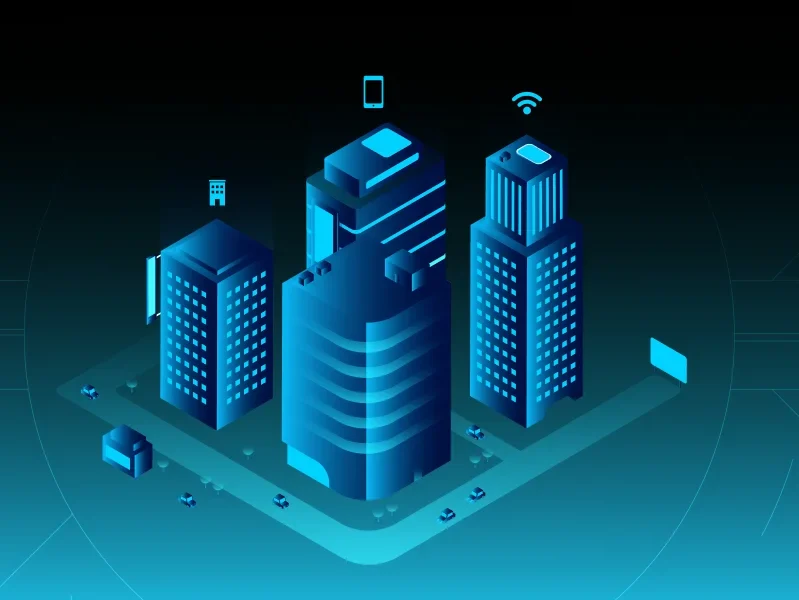Personalized services and excellent guest experiences become more meaningful in the hospitality area and artificial intelligence tools serve as conductors on the way to success. Intelligent digital assistants are redefining how hotels interact with their guests, raising efficiency, and enriching customer loyalty.
According to Statista’s most recent survey, about 50% of the respondents expressed some level of interest in staying at a hotel that uses automated messaging or chatbots to handle most customer service inquiries. In contrast, only around 9% percent of those surveyed indicated no interest at all. As we step into the realm of hotel chatbots, let’s explore how these virtual concierges are benefiting the hospitality business, from booking a room to enjoying an unforgettable vacation.
What Differs Chatbot for Hotel from Any Other?
At its core, a hotel chatbot is an AI-based software designed to engage with guests, respond to inquiries, and perform a multitude of tasks seamlessly. While both chatbots for hotels and generic chatbots share foundational principles of AI-driven communication, several differentiating factors set them apart and make hotel chatbots uniquely suited for the hospitality sector.
Hotel chatbots are finely tuned to possess in-depth knowledge of the hotel’s offerings, services, and policies. This industry-specific knowledge empowers them to answer guests’ questions accurately and efficiently, such as check-in and check-out, virtual tours, local recommendations, concierge services, billing and payments, and more.
Specifically trained algorithms offer personalized experiences, excel in reservation management, integrate seamlessly with hotel systems, provide multilingual assistance, and efficiently handle customer service requests. These differentiating factors make hospitality chatbots the ideal choice for hotels and resorts seeking to elevate guest experiences and automate operations. Let’s explore in detail 3 basic benefits you will get thanks to implementing AI technology.
24/7 Availability, Fast Replies
In the hotel industry, tourists’ needs and inquiries don’t adhere to a conventional 9-to-5 schedule. Travelers arrive at hotels at all hours, spanning different time zones and varying arrival times. Chat bot hotels are always “on call,” ready to engage with guests at any time of day or night. Whether it’s the middle of the night or an early morning check-in, guests can rely on chatbots and get help, information, and support promptly. Examples of instant response:
- Late-Night Guest Requests: The resident doesn’t have to wait until morning or disturb hotel staff at odd hours, ensuring a seamless and satisfying experience.
- Direct Booking: Why use a chatbot for hotel reservations? Several clicks replace the one-hour conversation with the manager and agreement on the dates of free rooms.
- Timely Assistance: People may have various needs during their stay, from troubleshooting issues with in-room technology to seeking information about local attractions. A chatbot for hotels provides immediate assistance by guiding individuals on how to operate in-room amenities or offering recommendations for nearby restaurants and entertainment. This real-time support contributes to a positive guest experience and minimizes inconveniences.

InterContinental Hotels Group launched IHG Chatbot that provides guests with information about IHG properties, room availability, direct bookings and payments. It offers assistance with booking reservations and provides answers to frequently asked questions.
Personalized Guest Experiences
Today, personalization goes beyond just knowing and using a guest’s name; it’s about understanding their preferences, anticipating their needs, and crafting tailored experiences that truly matter. From room preferences to dining choices, every detail matters in crafting a unique stay that fosters guest loyalty and satisfaction.
Hotel chatbots are equipped with data-driven capabilities that make personalization a reality:
- Guests Profiling: Chatbots analyze individual data from previous stays, including preferences, dietary restrictions, and special requests.
- Recommendation Engines: With the power of AI, chatbots can suggest room upgrades, spa treatments, or local experiences based on guest profiles.
- Contextual Conversations: Chatbots fully understand the context of conversations, including emotions, sarcasm and jargon.
Marriott International presented ChatBotlr. This hotel chatbot example offers personalized recommendations for hotel extra services, local attractions and dining options based on preferences, wishes, and past stays. ChatBotlr handles multiple languages, making it accessible to international visitors. For example, a guest expresses an interest in exploring the local cuisine. The chatbot, aware of their past dining choices, suggests nearby restaurants known for their specialties, ensuring the guest enjoys a culinary adventure that aligns with their tastes.
Data-Driven Insights for Elevating Business
Hotel chatbots, equipped with advanced analytics capabilities, play a pivotal role in collecting, analyzing, and applying data to enhance guest experiences.
Data is the compass guiding the hospitality industry toward excellence. Its significance lies in:
- Guest Personalization: Data enables hotels to personalize guest experiences by understanding preferences and anticipating needs.
- Business Efficiency: It helps streamline operations, optimize staff workload, and reduce resource wastage.
- Service Enhancement: Data-driven insights uncover areas for improvement in service quality, enabling hotels to refine their offerings continually.
Chatbots are collecting and processing information in several ways:
- Chatbot in hotels will record and analyze guest conversations, identifying common inquiries and preferences.
- They access booking histories to offer personalized recommendations and promotions.
- AI chatbot for hotels easily process guest feedback and sentiment analysis to gauge satisfaction levels.
- Chatbots analyze historical interactions to identify frequently asked questions and common inquiries. This data informs the creation of comprehensive FAQs and allows staff to focus on unique needs.
Data reveals trends and patterns in guest feedback. For instance, if several tourists express a desire for healthier dining options, the hotel can revamp its menu accordingly, ensuring it aligns with guest preferences.
3 Steps How to Implement a Hotel Chatbot with MetaDialog Team
Chatbots in hospitality industry not only enhance the guest engagement but also streamline hotel operations, making them more efficient and responsive to changing guest expectations and industry dynamics.
Implementing a hotel chatbot with the Metadialog team involves a collaborative approach. Here are three steps to guide you through the process:
- Define Objectives
Collaborate with the Metadialog team to define your hotel’s objectives and specific use cases. Discuss how the chatbot can enhance guest experiences, automate customer support, and meet your unique goals.
- Customize Solution
Work closely with our AI developers to customize the AI hotel chatbot to your hotel’s branding and requirements. Provide necessary textual content, including corporate information, templates, FAQs, and more. Ensure it integrates seamlessly with your booking systems and other relevant platforms.
- Train, Test and Launch
Train your digital assistant on real data and in a real environment. Conduct thorough testing to ensure the chatbot operates flawlessly. Plan future optimization based on feedback and data-driven insights.
MetaDialog’s chatbot solution is a game-changer for hotels. It makes guests happier, operations smoother, and helps you learn from data. Don’t wait, start using MetaDialog to make your hotel service today.
